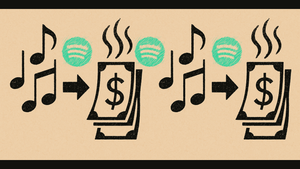Rapper RBX has sued Spotify, seeking to hold it responsible for streaming fraud that occurs on the digital music platform. Spotify is “turning a blind eye” to that fraud, he claims, allowing negligent conduct which is reducing the royalties he earns from tracks he released with the likes of Snoop Dogg, Dr Dre and Eminem.
No one denies that streaming fraud is a problem for the music industry, of course. Though it seems somewhat ambitious to try to hold Spotify legally liable for negligence and unfair competition - as RBX does - over its alleged failure to deal with that problem. But the rapper’s having a good go at it anyway - and, just to add to the drama, he’s dragged Drake into things too.
“Spotify publicly claims that it has policies and procedures in place to root out fraud”, says RBX’s class action lawsuit, filed with the courts in California. However, the lawsuit alleges, that “purported system” for combating streaming fraud is “nothing more than window dressing, inadequate at best”.
Because, it claims, Spotify has a vested interest in fraudsters setting up accounts on the platform to game the system, because its investors want to see constant growth in subscriber numbers. Which means, “Spotify is all too happy to turn a blind eye to the substantial number of fake users on its platform whose activities are controlled by artificial bots to fraudulently inflate streams”.
But streaming fraud “causes massive financial harm” to legitimate music creators and record labels whose “proportional share” of the Spotify royalty pool is “decreased as a result of fraudulent stream inflation”.
The lawsuit then makes a number of allegations about Drake’s streaming numbers being manipulated, which is somewhat ironic given Drake recently including complaints about the manipulation of Kendrick Lamar’s streams in his defamation lawsuit against Universal Music.
RBX’s lawsuit claims that there is “voluminous information” to suggest that “a substantial, non-trivial percentage” of Drake’s 37,000,000,000 streams on Spotify between January 2022 and September 2025 were “inauthentic and appeared to be the work of a sprawling network of bot accounts”.
The lawsuit seeks to back up the claims against Drake by the fact “a large percentage of the accounts streaming Drake’s music were geographically concentrated around areas whose populations could not support the volume of streams emanating therefrom”.
And that “an examination of Drake’s music streams reveals abnormal VPN usage”, because fraudsters were seeking to obscure their real locations. So, for example, “at least 250,000 streams of Drake’s song ‘No Face’ originated in Turkey, but were falsely geo-mapped through the coordinated use of VPNs to the UK in an attempt to obscure their origins”.
It’s not entirely clear where these figures are coming from, with the lawsuit simply stating that RBX and his team are “informed and believe” that these things happened.
Despite the specific Drake allegations, RBX’s lawsuit is also keen to stress that those claims are mainly included to demonstrate the bigger problem. “While the streaming fraud with respect to Drake’s songs may be one example”, it says, “it does not stand alone”.
There are various different kinds of streaming fraud, with various tactics being employed to artificially boost the streams of certain artists and tracks. That may be to make an artist look more popular that they really are and/or to pull more money out of the streaming royalty pool, which is allocated across the music industry on a consumption share basis. Some streaming fraud is connected to money laundering.
Some fraudsters set up their own accounts to manipulate streams. Hence the allegation that Spotify benefits from the fraud, because it makes it look like it has more subscribers than it really does. And if the fraudsters set up and use ad-funded free accounts, it can serve more ads.
However, fraudsters increasingly hack into otherwise legitimate Spotify accounts and play music when the actual subscriber is not using the service. That kind of fraud is much harder to detect - because some of the streams are legit - and it doesn’t benefit Spotify in the same way.
If the fraudster hacks into free accounts, the extra plays do allow more ads to be served, but ad income is a small part of Spotify’s wider business.
Presumably Spotify will respond to this lawsuit by insisting it has worked hard - and invested significantly - to crack down on fraud. While also disputing the allegation it benefits from having fraudsters on its platform, and picking holes in the specific negligence and unfair competition legal arguments.
Meanwhile, by fronting a class action that could benefit every American artist and label with music on Spotify, DBX says he is “giving voice” to more than 100,000 US rightsholders who “may be unable or too afraid to challenge Spotify, a powerful force in the music business, whose failure to act has caused significant problems and great financial harm”.

